Innovation and impact through cloud technology for Food and Trees for Africa | ITWeb

Food and Trees for Africa (FTFA) is a leading non-profit organisation that is involved in food security, social development and environmental initiatives. FTFA was founded in 1990 and is one of the first organisations to recognise the effects of climate change globally and start planting trees to combat changes in the environment.
In 1994, FTFA expanded their initiatives to food security and sustainability where they started the first school gardening programme in South Africa, the EduPlant Programme. These programmes soon expanded to include tree planting in underdeveloped communities in South Africa, deforestation, reforestation and afforestation initiatives as well as food gardens in schools and townships. Some of these food security programmes are income-generating market gardens or even larger scale farmer development initiatives. The core essence of FTFA is recognising the need for social development in the context of global climate change to achieve real, long-term sustainability. Part of the solution involves finding ways to alleviate and make communities aware of our impact on the environment in a way that is sustainable, uplifting and sensitive to cultural elements. These programmes soon expanded to include tree planting in underdeveloped communities in South Africa, deforestation, reforestation and afforestation initiatives as well as food gardens in schools and townships. Some of these food security programmes are income-generating market gardens or even larger scale farmer development initiatives. The core essence of FTFA is recognising the need for social development in the context of global climate change to achieve real, long-term sustainability. Part of the solution involves finding ways to alleviate and make communities aware of our impact on the environment in a way that is sustainable, uplifting and sensitive to cultural elements.
FTFA is responsible for building a number of environmental and social development software programmes and applications, such as Footprint.org and carbon calculators. These applications help clients understand their social development and impact metrics, namely, their return on social investment which looks at social and environmental impact. Footprint allows for clients to understand how and where the impact is made in various social development projects. Footprint uses a score-carding model to understand these situational and behavioural factors that can impact the environment to inform better decisions. In 2015, FTFA started collecting behavioural and situational data and in 2018 started formalising the process of data collection and developing systems that could use the data to measure impact and make social development decisions.
FTFA uses Google Workspace, specifically Google Forms, to collect data and script it into various formats used by teams in the organisation. At the start of 2019, FTFA decided to move to Google Cloud to allow for centralised data management, ease of scale, centralised processing and collaboration. Some of the Google Cloud’s services that are used by FTFA include App Engine and Firebase. FTFA felt that with Google Cloud, they would be able to collect data without having to use expensive platforms or systems. Google Cloud has allowed them to build data management systems without needing custom development. Google Cloud’s service offerings are geared towards data collection, scalability and have the right features and resources to allow for FTFA to take control of and clean their data. FTFA has used Google Cloud to build some core projects, including the carbon calculator and an application to allow for public participation in legislation linked to climate issues.
Since working with Siatik, Chris Wild from FTFA feels that Siatik has helped them with various aspects of Google Cloud, including billing and being a line of communication to technology companies in South Africa, specifically Google South Africa. Wild has noted that since moving to Google Cloud, their organisation has been more impactful and effective in their strategy as well as business processes. Google Cloud has allowed for FTFA to better manage and assess their beneficiaries and projects within their organisation. Since February 2022, FTFA’s social investment application has been used to assess over 1 400 beneficiaries across South Africa after moving over to Google Cloud.
For the last seven years, FTFA has been collecting data for their social development projects and beneficiaries and has found that none of their competitors can offer the same value for impact (VFI). Using Google Cloud, FTFA is able to build models to give feedback on clients’ return on social investment and what they can expect to receive back, making them industry leaders at the forefront of the latest technology.
One of the concerns that FTFA had when moving to Google Cloud was the resistance to change that could occur within their organisation. However, FTFA has made an active decision to ensure that people within their business are given purpose and perform tasks that involve engagement, understanding and collecting data. Even with job roles changing because of automation, in the social development industry, there is capacity for people to be utilised more effectively. FTFA has made sure to have a people management plan in place as they embark on their cloud journey.
